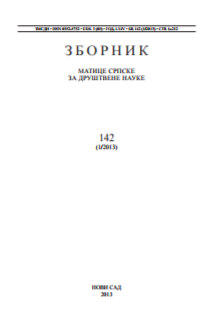НЕОМЕДИЕВАЛИЗАМ У САВРЕМЕНОЈ ДРУШТВЕНОЈ ТЕОРИЈИ
NEO-MEIDEVALISM IN CONTEMPORARY SOCIAL THEORY
Author(s): Aleksandar Saša GajićSubject(s): Sociology, Middle Ages, Recent History (1900 till today), Social Theory
Published by: Матица српска
Keywords: neo-medievalism; crisis; social theory; new paradigms; analogies;
Summary/Abstract: “Neo-medievalism” has become well known concept in contemporary social theory. It is widely used by historians, sociologists of culture and international relations theorists, not only for the critical reconsideration of heritage from “historical” Middle Ages, but also for the easier and more accurate distinguishing of their cultural-historical and international-political aspirations through analogies with contemporary social processes. This paper deals with the emergence of “neo-medieval motives“ in social theory and philosophy since Romanticism, throughout “catholic cultural renewal” and “Russian religious renaissance”, up to their influences on “theories of crisis of modernity” from the first half of 20th century and on significant works of Spengler, Toynbee, Ortega y Gasset and Pitirim Sorokin. Then, author follows the revival of interests for Middle Ages in the seventies of the last century along with the onset of postmodernism, and also the first use of “neo-medieval model” for explanation of international relations transformation (in the work of Hedley Bull and his followers). Finally, contemporary “neo-medieval” tendencies in scientific approaches are being observed – from the systemic transformation from a modern to a postmodern political economy, throughout urban studies, sociology and philosophy seeking again the indisputable epistemological support in religion and tradition.
Journal: Зборник Матице српске за друштвене науке
- Issue Year: 2013
- Issue No: 142
- Page Range: 49-61
- Page Count: 13
- Language: Serbian

